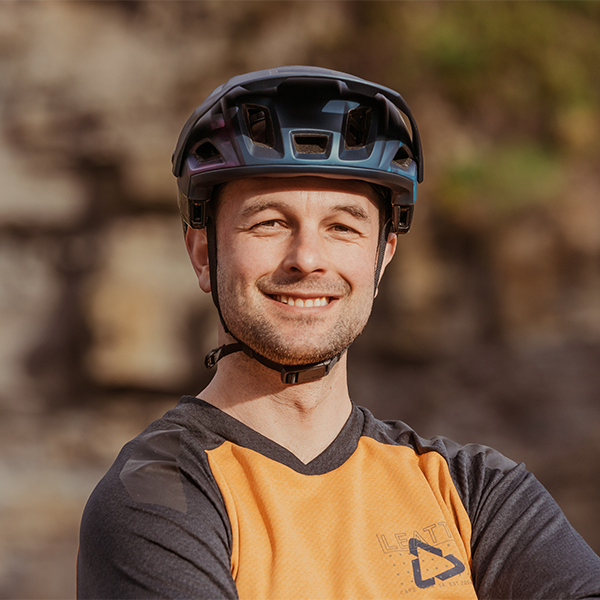The best trail bikes hit the sweet spot between rowdy enduro bikes and svelte cross-country bikes, delivering performance that's equal parts fun and super-capable.
This has made trail bikes an incredibly popular category among the best mountain bikes in recent years. They give you a bit of everything, and open up the widest range of trails and riding when compared to other types of mountain bike.
The flipside is choosing the best trail bike for you can be quite a bewildering prospect – there are simply so many options on the market.
Fortunately, you've come to the right place, because our expert mountain bike testers have spent years riding and reviewing dozens of trail bikes. This list of the best trail bikes in 2025 will help you find the perfect machine for you.
We've also put together a buyer's guide to trail bikes at the end of this list that explains everything you need to know about this type of mountain bike. From what sort of terrain they are good for to the size of the disc brake rotors – we've covered it all.
Editor's note: this article was updated on 24 July 2025 with our latest high-scoring reviews, including the Pivot Trailcat LT Pro X0, Spot Ryve 115 6-Star AXS, Calibre Bossnut, Whyte T-140 S, YT Izzo Core 3 and Evil Offering LS. We have also added details on how we test trail mountain bikes and shared why you can trust BikeRadar.
Best trail mountain bikes in 2026
Whyte T-160 RS
SQUIRREL_TEXT_13123888

- £2,999 as tested
- Pros: Fast and reassuring on the descents; well-specced for the money; good climbing ability
- Cons: Seat angle could be steeper
We were so impressed with Whyte's T-160 RS that it won the title of Trail Bike of the Year 2024.
The British brand has given the bike an almost unbelievable spec list for the money, with a RockShox Lyrik Ultimate fork and a Super Deluxe Ultimate RC2T shock used for suspension.
We found the T-160 RS performed well on rough trails, remaining calm over rocks and roots thanks to the sophisticated suspension.
It's a bit hefty at 16kg, but it tackles climbs with comfort and efficiency – although we'd have liked a slightly steeper seat angle.
- Read more: Whyte T-160 RS review
SQUIRREL_13123888
Atherton A.150.1

- £7,900 as tested
- Pros: Suspension performance excels; comfortable on the climbs; efficient; balanced, customisable geometry; great ride feel; 22 size options
- Cons: Functional rather than fancy spec; cost
The Atherton Bikes A.150 is a masterpiece of production processes and suspension design. Like its carbon stablemates, it's constructed of carbon tubes bonded into Additive-Manufactured 3D-printed titanium lugs.
On the trail, the A.150 performs impeccably. Its suspension is out of this world and the stock geometry is balanced, bolstering that incredible suspension’s performance. Thanks to the 22 size options – plus further customisation if you desire – there’s no doubt you’ll find your Goldilocks figures.
It’s expensive, especially for the level of kit bolted to it, but most of the asking price is going towards the frame’s tech rather than the functionally impressive (if not glitzy) parts bolted to it. If you can stomach the cost, from a performance perspective, there are no reasons not to plump for the A.150.
- Read more: Atherton A.150.1 review
Canyon Spectral CF7
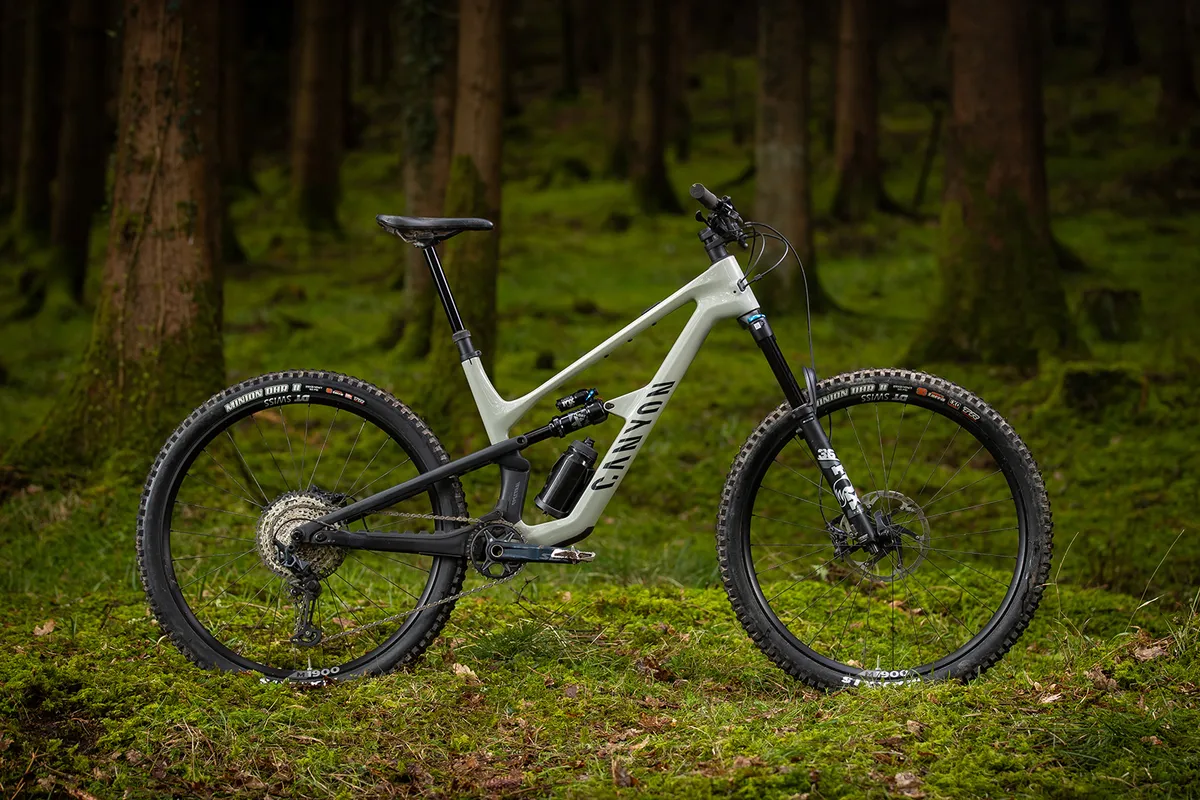
- £3,299 / $3,699 / €3,449 / AU$5.249 as tested
- Pros: Playful character that's stable at high speed; smooth, comfortable suspension; well thought-out geometry
- Cons: Fork isn't the most supportive when riding aggressively; down-tube storage doesn't feel the sturdiest
The Spectral offers impressive ground-covering ability for all-day cruises and a geometry that leaves nothing to be desired on the descents.
It's playful on all gradients and remains settled when ploughing through rough sections of the trail. This is helped by Canyon's KIS (Keep It Stable) system, which uses a pair of springs to connect the top tube and fork steerer.
The bike represents exceptional value, with a carbon frame and fantastic spec list sealing the deal.
While the Fox Rhythm 36 fork proved easy to set up, we felt it could be more supportive for aggressive riding.
- Read more: Canyon Spectral CF7 review
Norco Fluid FS C2
SQUIRREL_TEXT_13123899
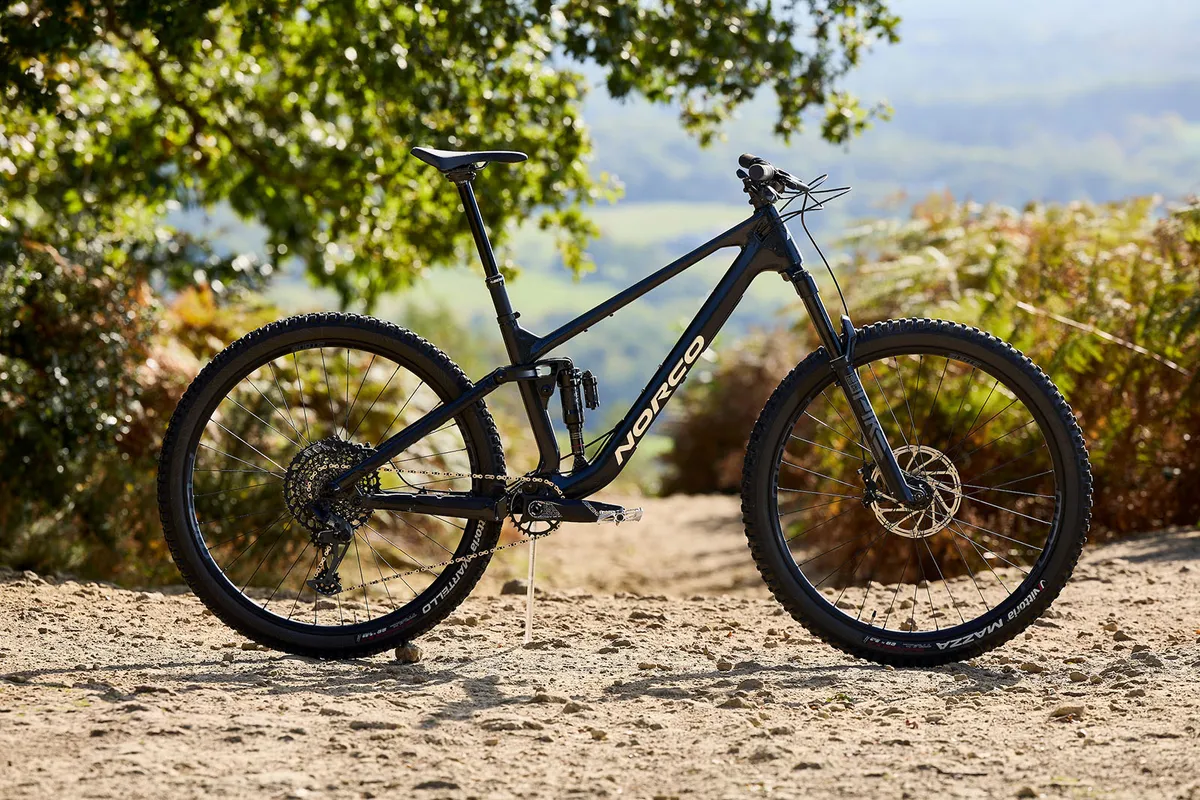
- £4,999 / $4,999 / €5,299 as tested
- Pros: Confidence-inspiring geometry; makes good use of suspension travel
- Cons: Brakes could be more powerful; tyres won't suit everyone
Norco's Fluid FS C2 has a playful agility on the trail that remains composed at high speeds.
With a 140mm RockShox Pike Select+ fork up front and a Super Deluxe Select+ controlling 130mm of rear-wheel travel, the Norco feels planted through rough terrain, balancing a poppy yet bump-gobbling ability.
We found the Fluid capable of all aspects of trail riding, but it was on the hills where it really impressed, with the bike eager to attack short, sharp climbs with grace.
Because it's able to carry a lot of speed down the trail, the SRAM G2 RS brakes feel a little under-gunned in some situations, with the bike deserving of more powerful brakes.
- Read more: Norco Fluid FS C2 review
SQUIRREL_13123899
Pivot Trailcat LT Pro X0

- £9,600 / $8,799 / €8,999 as tested
- Pros: Impressive geometry; good pedalling performance; balanced suspension
- Cons: Pricey; Super Boost rear-axle spacing not for everyone
The Pivot Trailcat LT Pro X0 manages its 135mm of travel effectively, making it feel like a bigger bike on descents while retaining its playfulness and eager climbing ability.
We found the geometry to be confidence-inspiring, with the position supporting you well up or down a mountain.
It is pricey, but the spec level on this build goes some way to justifying that.
Some buyers may not like Pivot's decision to use Super Boost rear-axle spacing on the rear because it's less common than normal Boost.
- Read more: Pivot Trailcat LT Pro X0 review
Santa Cruz Bronson CC X0 AXS RSV
SQUIRREL_TEXT_13143747

- £8,799 as tested
- Pros: Predictable and muted suspension; sorted geometry; mixed wheels balance drifting fun and straight-line stability; very impressive spec list; easy setup
- Cons: Very expensive; not the fastest climber
On the trail, predictability and muted, well-damped suspension reign supreme and the Bronson (now in its fifth iteration) is beautifully calm in all respects. Whether you’re pedalling hard, pushing your limits in rough terrain, pumping jumps or hammering on the brakes, it remains a steadfast and predictable companion.
Its suspension and geometry give it a wide performance bandwidth; you can either work it into the terrain or let it dance over the top.
Spec-wise, this top-spec model leaves little room for upgrades. As a package – with low weight, sorted geometry, impressive suspension performance and good general balance – it punches both below its weight and above its travel in the trail and enduro categories respectively.
- Read more: Santa Cruz Bronson CC X0 AXS RSV review
SQUIRREL_13143747
Trek Top Fuel 9.8
SQUIRREL_TEXT_13122540

- £6,500 / $7,000 as tested
- Pros: Quiet, composed and capable in a surprising range of terrain; decent kit selection; adjustable suspension makes a noticeable difference to feel
- Cons: Our test wasn't a fan of the one-piece cockpit piece cockpit bar/stems
The Top Fuel is Trek’s short-travel trail ripper, with just 120mm of rear travel, controlled by Trek’s signature ABP linkage.
The 9.8 is the third-tier model in the Top Fuel range and gets a decent spec - Select+ suspension from RockShox, SRAM GX AXS Transmission and four-piston Bronze-level brakes.
A four-position flip chip offers up more (19 per cent), or less (14 per cent) progression for the air shock, as well as doubling up as the High or Low geometry-setting chip. The differences aren’t world-changing, but they are noticeably divergent enough to make a real-world difference.
The least progressive setting gives the Top Fuel its traditional XC-racer-like feel. It’s sprightly, reactive under pedalling and aggressive.
Pop the lower shock mount into the more progressive setting and you can turn the Top Fuel into more of a true trail bike. The early part of the stroke is softer and more comfortable, taking the edges off the hits and pumping through terrain results in a slightly more muted ride feel. While the support is there, it’s deeper into its travel.
The Top Fuel might not be a true quiver killer but, with its two personalities, it comes as close as any bike we’ve ridden in recent times.
- Read more: full Trek Top Fuel 9.8 review
SQUIRREL_13122540
YT Jeffsy Core 1
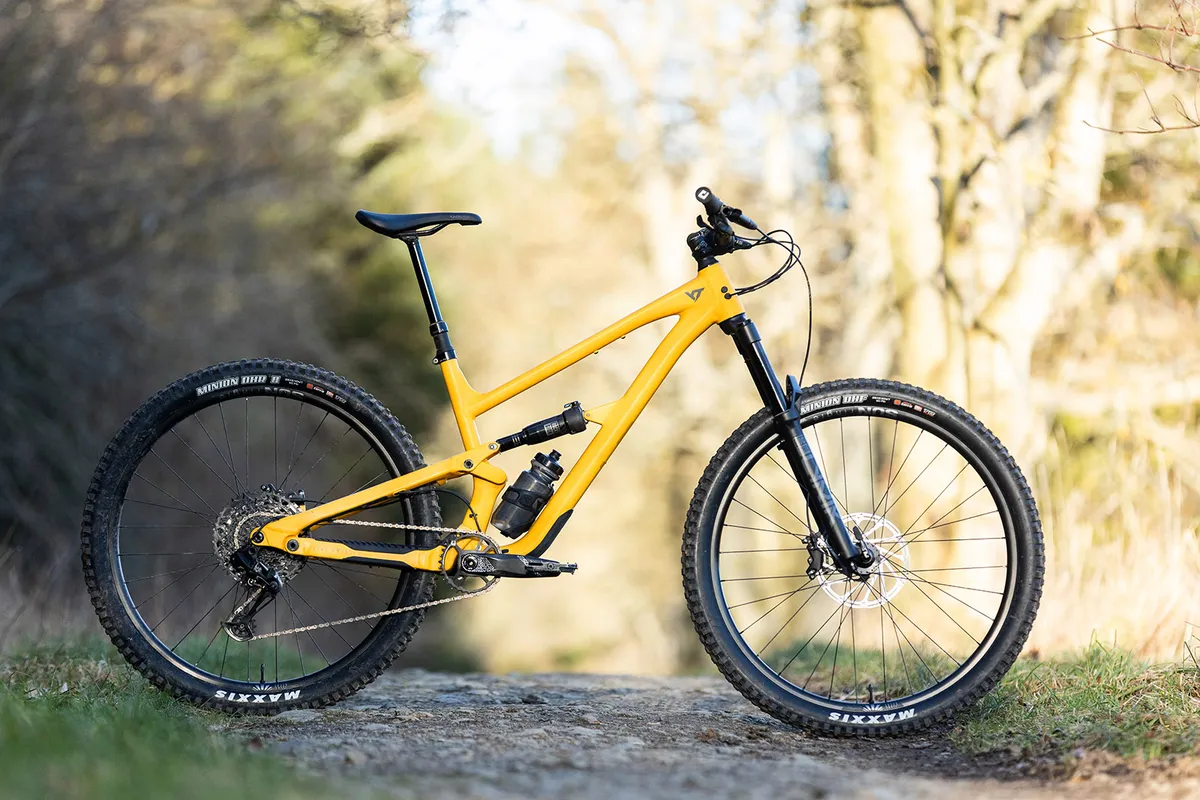
- £2,499 / $2,799 / €2,499 as tested
- Pros: Confidence-inspiring geometry; good spec for the money; fork performs well
- Cons: It's not the the lightest
YT's entry level to the Jeffsy range offers the value for money often associated with the German direct-to-customer brand.
The bike offers impressive capability, tackling enduro trails with ease while remaining playful on mellower trails.
A centred riding position gives you plenty of confidence to push the bike to the limit on the descents. A steep 77.9-degree seat angle puts your weight over the BB, helping on technical climbs.
It's not the lightest trail bike we've tested, but we feel this is less important with it sitting towards the more aggressive side of the segment.
- Read more: YT Jeffsy Core 1 review
Calibre Bossnut
SQUIRREL_TEXT_13155196

- £1,700 (£1,499 with Discount Card) as tested
- Pros: Great geometry; good value for money; great upgrade potential
- Cons: Spec can't match frame's performance
The Bossnut is a cult classic to many, and back from its pandemic hiatus, the new model offers similar value for money as its predecessor.
We found the excellent geometry made the bike fun in the local woods, as well as on more built-up trails.
Its components run out of ability before the frame, giving the bike huge upgrade potential.
We found the brakes to be a tad wooden and the fork a little spiky in compression.
- Read more: Calibre Bossnut review
SQUIRREL_13155196
Cannondale Habit LT 2
SQUIRREL_TEXT_13118249

- £3,500 / $3,625 / €3,699 / AU$5,899 as tested
- Pros: Spritely and playful character; good climber; absorbs big hits well
- Cons: Basic suspension dampers aren't the smoothest
The Habit LT 2 is Cannondale's long-travel trail bike with 140mm of rear suspension travel matched to a 150mm fork upfront.
We found the bike enjoyed being pumped and pushed over tough terrain while being able to absorb big impacts when asked to.
The suspension isn't as smooth as forks that use posher dampers, but the confidence-inspiring brakes and geometry will allow you to push the bike on more challenging trails.
- Read more: Cannondale Habit LT 2 review
SQUIRREL_13118249
Evil Offering LS

- £8,500 / $8,999 / €9,599 / AU$14,620 as tested
- Pros: Impressive suspension performance; exciting ride feel; confidence-inspiring
- Cons: Not the most contemporary geometry; climbing performance could be better
The Offering LS uses Evil's Delta System suspension to manage 141mm of rear travel, which gives the bike an all-conquering feel on the descents.
While the geometry isn't as up-to-date as others on this list, the Offering LS still feels confident on a variety of trails and has an exciting, playful character.
Its climbing won't win you any medals, but if you're looking for a more gravity-inspired trail bike, it's definitely worth a look.
- Read more: Evil Offering LS review
Forbidden Druid V2 MX
SQUIRREL_TEXT_13133330

- £6,999 / €8,699 / $6,899 as tested
- Pros: Impressive suspension performance climbing and descending; formidable grip; very versatile
- Cons: Larger brake rotors would boost confidence; more drivetrain drag caused by idler wheel; more chain maintenance needed; poor value
The Forbidden Druid V2 MX is an extremely capable trail bike, especially considering its modest 130mm of travel.
While the Druid's asking price isn’t cheap, you get a decent selection of kit and a frame that’s had plenty of research and development prior to its launch.
Its high-pivot suspension design and chain idler layout give it modest small-bump sensitivity, impressive square-edge hit absorption and descending progression that belies its travel numbers.
Still, there’s a trade-off for this impressive descending capability – its pedalling performance is acceptable, but not class-leading, and there’s no denying the idler wheel isn’t as efficient as a traditional drivetrain setup.
The Druid will appeal to those seeking a short-travel trail bike with the heart of an enduro bike – there are similar-travel trail bikes that pedal better, but they can’t be thrashed as hard on the descents.
- Read more: Forbidden Druid V2 MX review
SQUIRREL_13133330
Marin Rift Zone 29 XR
SQUIRREL_TEXT_13090289

- £3,775 / $3,899 / €4,289 / AU$5,499 as tested
- Pros: Fast and stable at speed; clever spec choice; impressive on technical terrain
- Cons: Not the best climber; freehub engagement could be better
Marin's Rift Zone 29 XR is built for the descents, with the frame and suspension offering a great platform for tearing up your local forest.
With only 130mm of rear-suspension travel, the Rift Zone 29 XR proves numbers aren't everything by absorbing big bumps and providing a composed ride feel.
We found the Rift Zone 29 XR wasn't the fastest on the climbs, but it made up for this when pointed downhill.
- Read more: Marin Rift Zone 29 XR review
SQUIRREL_13090289
Merida One-Forty 500
SQUIRREL_TEXT_13086543
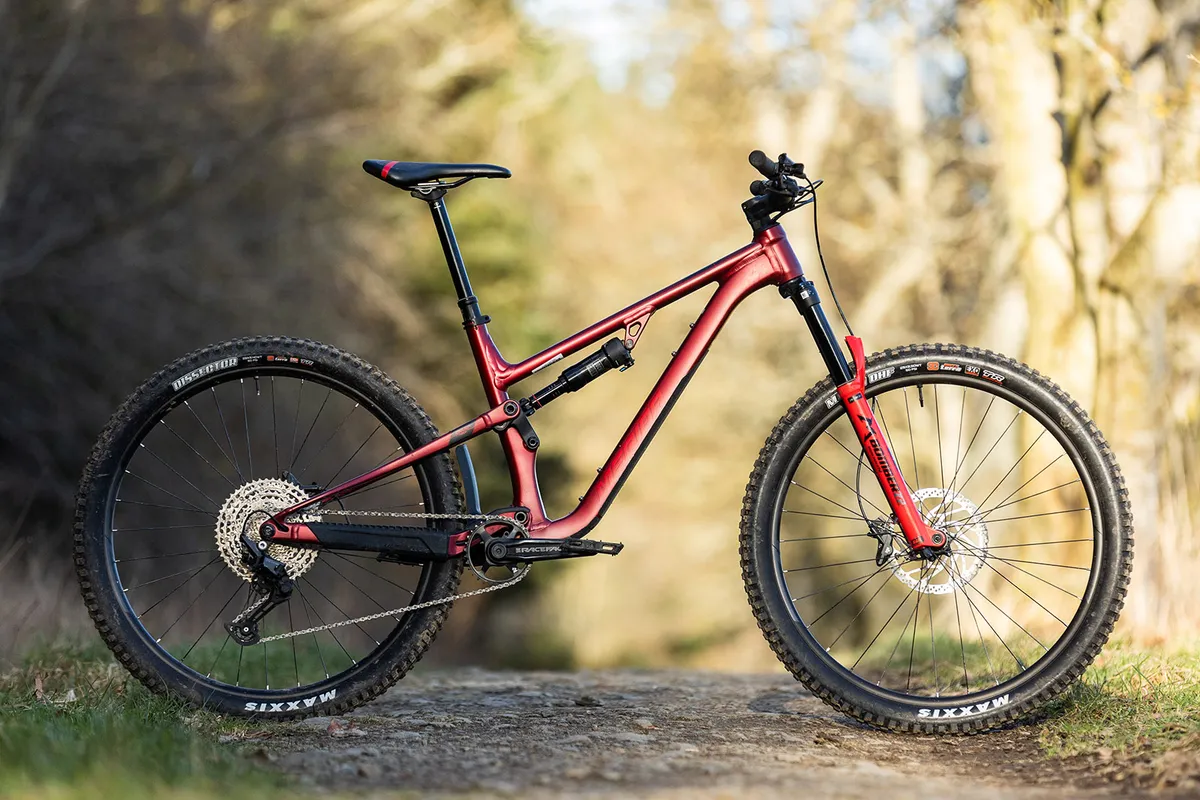
- £2,600 / €3,160 / AU$3,799 as tested
- Pros: Efficient pedalling; playful handling; good spec for the money
- Cons: Rear-end grip isn't the best in the wet; brake bite point can wander
The One-Forty 500 uses the same frame as the One-Forty 700 that we awarded Trail Bike of the Year in 2023.
At this lower price point, the bike remains an impressive performer with eager climbing characteristics and supportive suspension on the descents.
The bike offers an impressive spec for the money, though we did find the Shimano Deore four-piston disc brakes a little unpredictable, with a wandering bite point affecting the accuracy of our braking.
- Read more: Merida One Forty 500 review
SQUIRREL_13086543
Specialized S-Works Stumpjumper 15
SQUIRREL_TEXT_13133715

- £10,000 / $12,000 / €13,000 as tested
- Pros: Great geometry that’s easy to adjust; impressive suspension feel that can be altered easily; very capable and versatile
- Cons: Tougher rear tyre would up performance further; very pricey; Pro version rides just as well
The S-Works Stumpjumper is made from Specialized’s FACT 11m carbon fibre. This includes both front and rear triangles and, in the case of this top-end bike, the rocker link – something no other bike in the line-up is treated to.
At the heart of the Stumpjumper 15 is the Fox Factory Float shock with Specialized GENIE technology. The proprietary shock design contains two, rather than one, positive air chambers and aims to flatten the spring curve in the first 70 per cent of travel, before reducing the overall air volume and upping the progression considerably in the final 30 per cent.
The S-Works Stumpjumper is a seriously capable, fun bike to ride and its tunability and versatility make it a real jack of all trades. Although it’s nimble and agile on the trail, there’s still a reassuring air of calm when things get a little rowdier.
In this top-end guise, it’s hard to find fault with the spec. It’s undeniably pricey, especially since the cheaper Pro version rides just as well and saves a chunk of cash.
- Read more: Specialized S-Works Stumpjumper 15 review
SQUIRREL_13133715
Spot Ryve 115 6-Star AXS

- £7,113 / $9,399 / €8,436 / AU$14,793 as tested
- Pros: Impressive climbing performance; lively on the trail; good suspension feel
- Cons: More powerful brakes would improve ride; seat tube angle feels slack
The Ryve 115 sits on the cusp of the downcountry segment, with 115mm of suspension provided via a novel leaf spring linkage design.
For its intended use, the suspension impresses with suppleness and a lively character – although it does come unstuck in choppy segments of trail.
More powerful brakes would add to the bike's prowess on descents, and while the climbing ability is impressive, the seat tube angle may feel slightly slack to some.
- Read more: Spot Ryve 115 6-Star AXS review
Starling Murmur

- £7,000 as tested
- Pros: Great small-bump performance; balanced climbing and descending feel; smooth ride quality; easy to set up; single-pivot simplicity
- Cons: Deep-travel hits could be managed better; air-shock option to increase progression; not the fastest or lightest 135mm-travel bike
Starling Cycles’ Murmur is a steel-framed, 135mm-travel single-pivot bike made in the UK.
As the only full build available directly from Starling, it’s no surprise the Murmur’s decked out with high-performing parts from the likes of Öhlins, Shimano, Hope and DT Swiss.
On the trail, the Murmur is a glowing example of a trail bike; it handles rough and smooth terrain, and the fast and slow with equal competence. It has limits like any trail bike, but pushing beyond these doesn’t see performance drop off a cliff edge.
Uphill, the seated climbing position is impeccable – your hips sit directly over the bottom bracket, which makes for a comfortable and efficient position.
All in all, the Murmur is a fuss-free performer that proves there’s plenty of life left in a single-pivot design.
- Read more: Starling Murmur review
Trek Fuel EX 9.7

- £4,175 / $4,000 / €4,499 / AU$7,500 as tested
- Pros: Excellent frame; well-considered geometry; very capable with great suspension
- Cons: Poor brakes; tyres aren't the best
The Fuel EX frame provides a solid, adaptable and high-performing bedrock to the bike with the geometry and suspension design offering good confidence on the descents.
Our tester found the SRAM DB8 brakes to be a little underpowered when riding aggressively, compromising the bike on fast, technical downhill sections.
The tyres were also behind the competition, making for a less-than-precise ride feel.
- Read more: Trek Fuel EX 9.7 review
Whyte T-140 S
SQUIRREL_TEXT_13151958

- £1,999 as tested
- Pros: Excellent geometry for descents; supportive suspension; value for money
- Cons: Seated climbing position not the most efficient; some less than impressive spec
The T-140 S offers good value for money, with quality RockShox suspension featuring front and rear, giving the bike a luxurious and supported ride feel.
On the descents, the bike eats up like a mini enduro bike, with the geometry inspiring confidence on even the steepest terrain.
This comes at a sacrifice on the climbs, with the seated position not feeling very efficient when pedalling up to the top of the trail.
We also found some spec choices to be less than ideal, with wooden-feeling brakes and clunky gear changes felt in testing.
- Read more: Whyte T-140 S review
SQUIRREL_13151958
YT Izzo Core 3

- £4,499 as tested
- Pros: Fast-feeling ride; well-specced; racy geometry
- Cons: Not the most forgiving; quite focused on speed
The Izzo Core 3 borders on downcountry territory, with 130mm of suspension delivering cushioning from the trail below.
We found it to feel very racy, with a focused geometry and suspension setup that those looking for speed will appreciate. However, this comes across as a little unforgiving when cruising down a trail.
We found the rear-damper tune out of the box compromised the bike's ride, and the racy nature limits the bike's adaptability.
- Read more: YT Izzo Core 3 review
How we test trail mountain bikes

We test trail mountain bikes out where they belong, and make sure to push them to the limit on technical trails.
Our testers have reviewed hundreds of trail mountain bikes in their time, so they are clued up on how to separate the good from the bad.
Ultimately, our trail mountain bike reviews are based on the following criteria:
- Suspension characteristics – how does the bike's suspension perform on descents, and is it supportive for climbs?
- Handling characteristics – how does the bike ride on tight, technical trails.
- Price – how does the bike shape up against the competition on price? Is it a good deal?
- Subjective reflections – our testing always aims to be objective, but we also recognise that some features and characteristics will suit individuals differently. We aim to reflect these in our reviews, giving you the information you need to make the best buying decision.
Why you can trust BikeRadar
BikeRadar has been an authority on bikes and cycling tech since its inception in 2007, delivering the world’s best riding advice.
We have experts testing all types of bikes, parts, clothing and accessories, from road, mountain and gravel bikes to commuting, bikepacking and electric bikes.
Our reviews are always editorially independent – with no exceptions. Our reviewers comprehensively test all products in the real world, always reflecting on performance, value and the wider market when delivering their verdicts and review ratings.
We have more than 15,000 product reviews available at your fingertips, as well as expert buying, maintenance, training, skills, health and fitness advice.
Our annual Bike of the Year test is an industry benchmark and the BikeRadar team consists of some of the most experienced riders and testers in the business.
Trail bike buyer’s guide | Everything you need to know when choosing a trail bike
What is a trail bike?
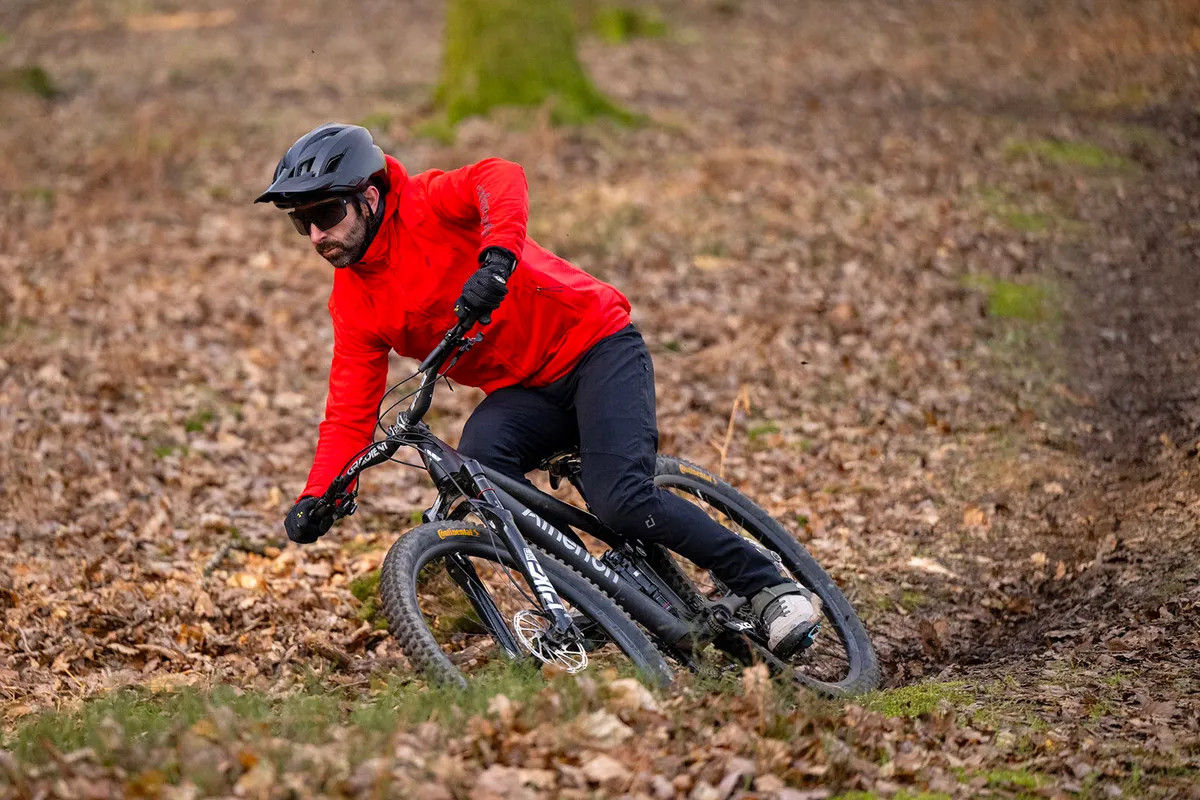
The trail mountain bike category occupies the space between lightweight, speed-focused cross-country bikes and enduro and all-mountain mountain bikes designed to fly downhill and slowly winch back to the top.
Balancing pedalling efficiency and gravity potential, trail bikes are intended to hit a sweet spot; they aren’t quite as rowdy as enduro bikes but are tougher than cross-country bikes.
They make light work of riding down flow trails with big sweeping berms and can cut it on more demanding terrain too – and you might be surprised at just how capable they truly are.
Really, trail bikes are best for mountain biking in the most general sense and are designed to give you just about enough of everything.
Trail bikes also tend to be relatively affordable when compared to other types of mountain bike. The components don’t have to be super-lightweight as on XC bikes, or heavy-duty enough to survive the rigours of downhill, which helps to keep costs down.
Although enduro and downhill bikes are considered to be the Formula 1 of mountain biking, we think trail bikes are the most important and widest-spanning category, and benefit from economies of scale where bigger production runs also play a factor in keeping prices down.
The affordability of trail bikes combined with their versatility, helps to make them an ideal choice if you’re new to the world of mountain biking or are looking for a one-bike solution to all your mountain biking needs.
What to look for in a trail bike
There are no set rules when it comes to defining what a trail bike is and, like all mountain biking sub-disciplines, they exist on a sliding scale in terms of capability, geometry, suspension travel and price.
However, there are various factors that when put together constitute a trail bike and are worth bearing in mind when looking for one of these versatile machines.
Frame material

Many brands stick to aluminium alloy or carbon fibre for trail bike frames, while some more boutique builders opt for alternative frame materials, such as steel or titanium.
Carbon has the advantage of being lighter and stronger, and can be made to be stiffer than an equivalent aluminium frame, so it's a good choice if zipping uphill and weight are priorities. It does, however, cost more than aluminium.
While it might not have the exotic feel of carbon, or be as lightweight, an aluminium frame is a good call if you’re new to the sport or on a budget, but it’s hard to argue with the desirability and performance of carbon.
Geometry
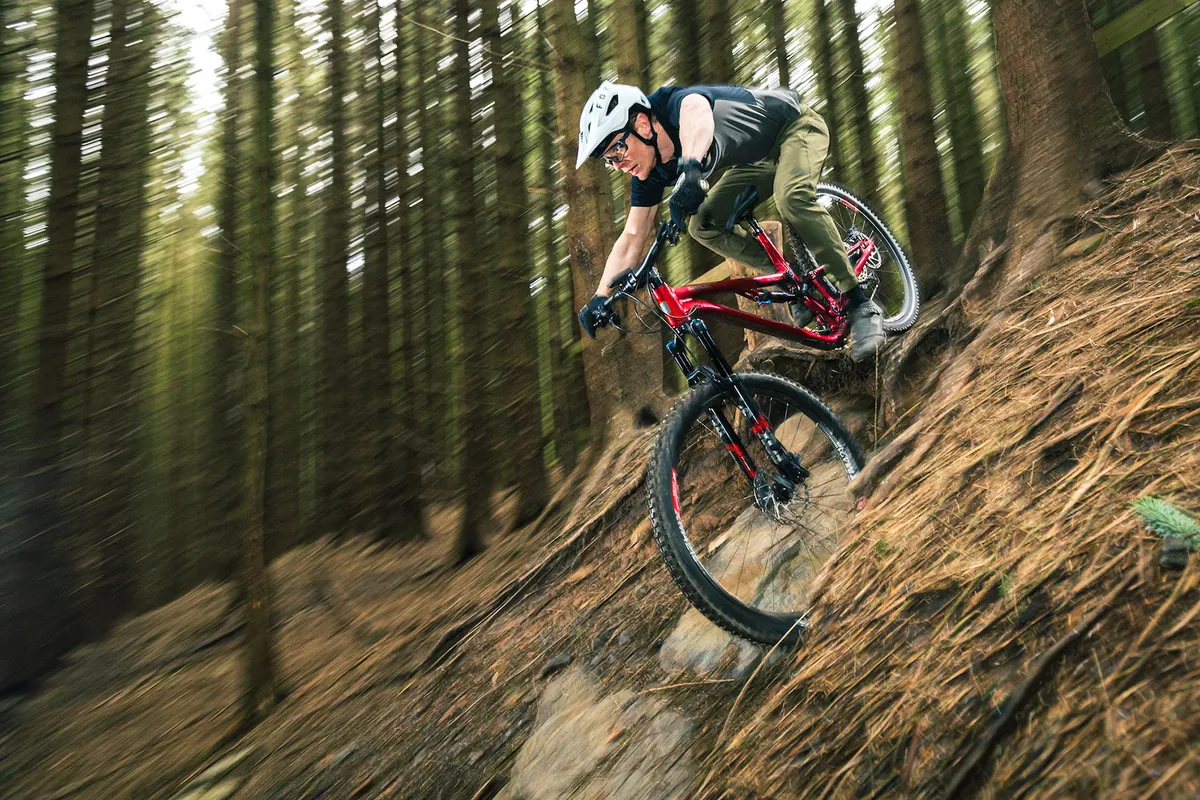
Frame geometry probably has the biggest impact on how a mountain bike handles, with even slight adjustments to the wheelbase, head tube angle and reach determining how a bike feels.
In keeping with their Goldilocks position between XC and enduro bikes, trail bikes have a relatively slack geometry that makes them capable enough to handle most rough descents, while being suitable for all-day epics and plenty of comfortable and efficient climbing.
As a general rule, trail bikes have a head tube angle of between 64 and 66.5 degrees and seat tube angle of between 73 and 78 degrees.
Look for slacker head tube angles if you want a bike that will descend better, because a slacker angle helps give the bike a calmer ride by slowing down the steering. It also makes its wheelbase longer, which helps improve stability at high riding speeds.
Travel
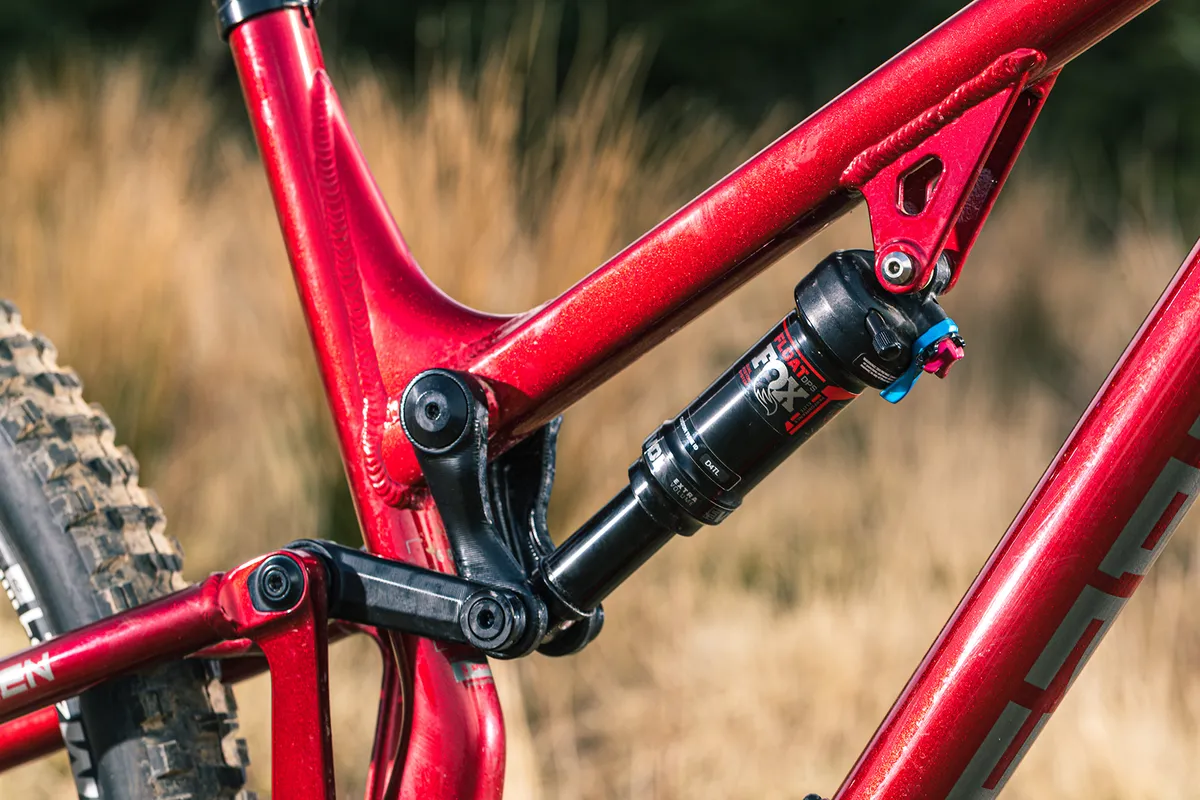
Most commonly, trail bikes have front and rear suspension with between 120mm and 150mm of travel.
As travel increases, a bike will be better suited to riding downhill and less suitable for climbing, so when considering how much travel to go for on a trail bike think about the type of terrain you'll spend most of your time riding and your riding style.
If you ride on rougher, more technical trails, or like to barrel down descents, choosing a trail bike with 140mm or 150mm is advisable.
Shorter-travel bikes won’t descend quite as well, but they are light and efficient so are a good choice if endurance riding and climbing is more your thing.
Wheel size and tyres
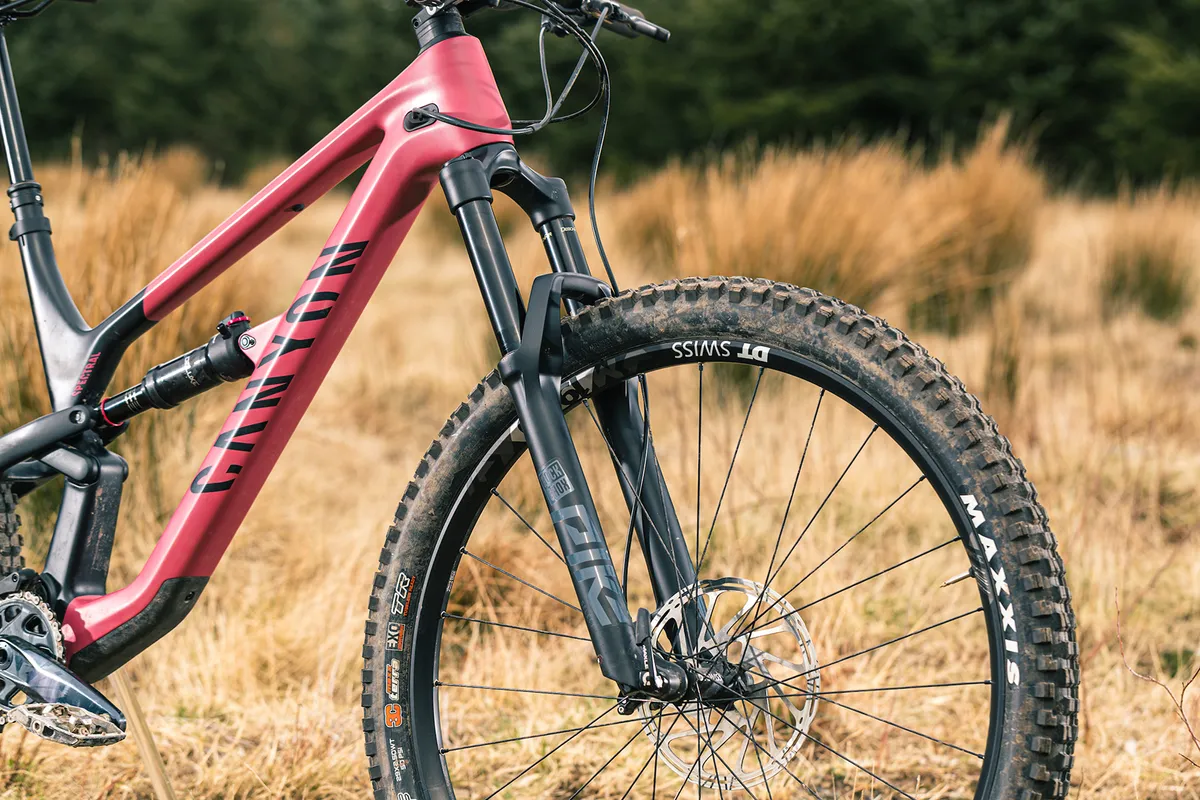
There used to be a time when mountain bikes simply had 26in wheels. But those days are long gone, and now mountain bikes come with either 27.5in or 29in wheels.
Both wheel sizes have their advantages and disadvantages. 29in wheels roll over obstacles and hold their momentum more, making them the preference for cross-country and the best downcountry mountain bikes. Compared to 29in wheels, 27.5in wheels are faster accelerating, stronger and more agile, with handling and placement feeling more natural too.
Trail bikes come with either of the two sizes and there isn’t really a right or wrong answer to which size wheels you should go for – you might prefer the snappier feel of 27.5in wheels or value the efficiency of 29in wheels.
One thing to bear in mind when selecting what wheel size to go for is your height. A taller rider will probably benefit from a larger wheel, whereas a shorter rider will benefit from a smaller wheel. Some manufacturers do consider this and provide models with different-size wheels depending on frame size.
Trail bike tyres tend to be chunkier with a decent amount of tread and are around 2.3 to 2.5in wide. These provide a decent amount of grip and help make trail bikes the versatile machines they are.
The best mountain bike tyres can really change how your bike feels, so it’s worth paying attention to what tyres a trail bike is specced with, but also remember that it’s not too hard to swap tyres out for something more suitable for your riding.
Drivetrain
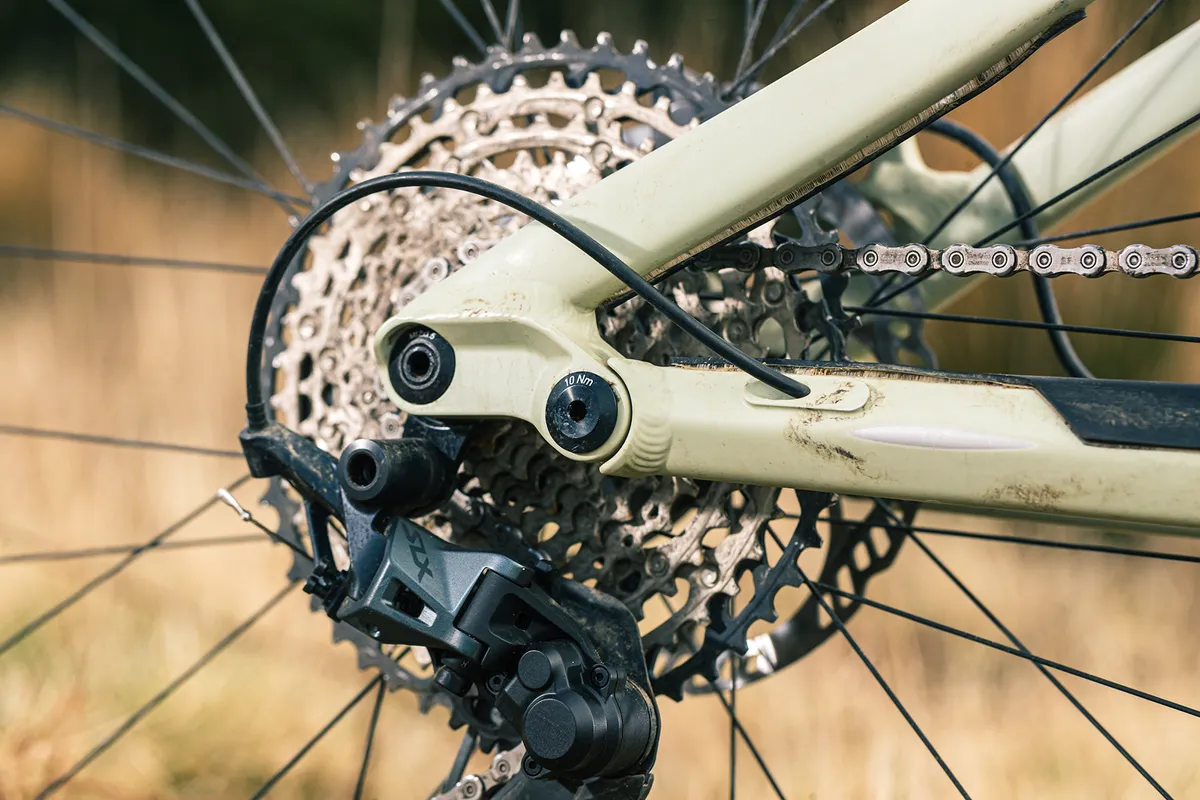
Trail bikes tend to have drivetrains with one front chainring. Thanks to wide-ranging 12-speed cassettes (normally between 10 to 52t), only having one front chainring doesn’t limit climbing potential.
Groupsets such as Shimano Deore XT M8100 are a popular choice on trail bikes. Trail bikes also tend to have easier gearing than speed-focused XC bikes. Front rings are usually between 30- and 34-tooth, while rear cassettes can go up to 52-tooth.
This gives trail bikes a wide range of gears for enough speed on the flat and to help you get up tough climbs.
Brakes
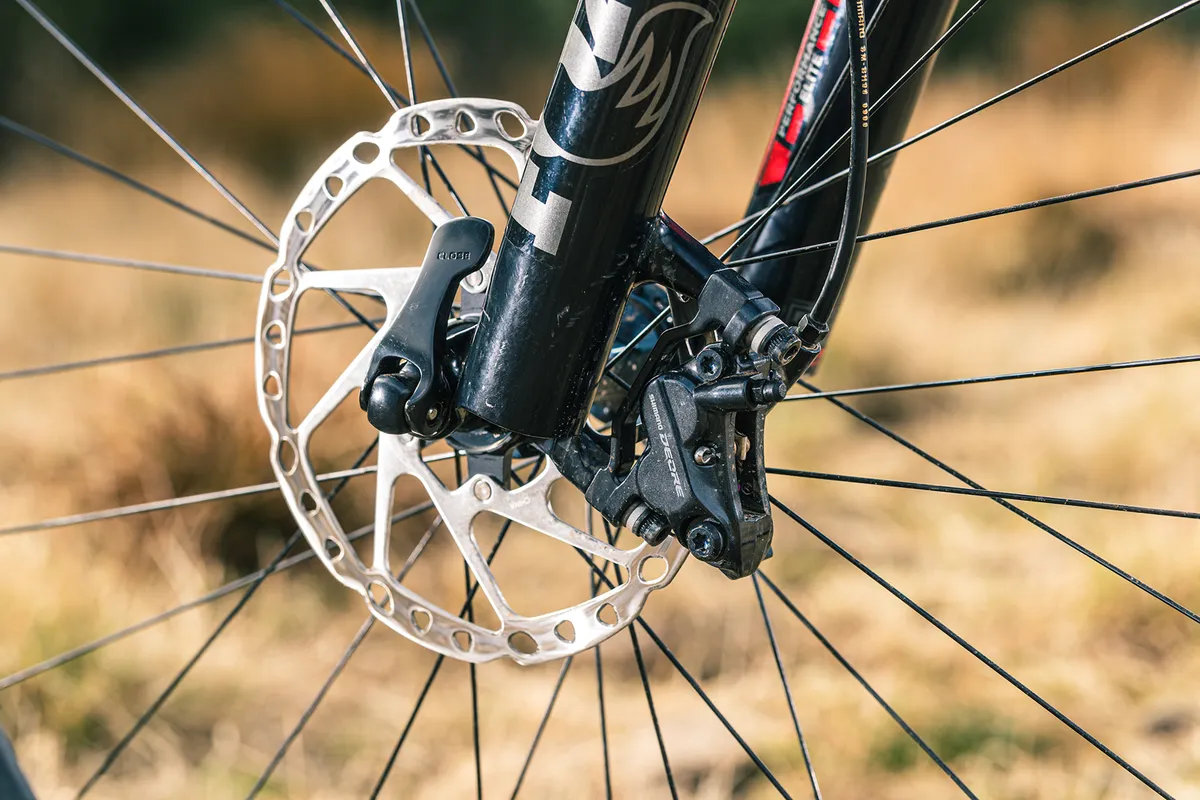
Like most aspects of trail bikes, the brakes strike a balance between stopping power and weight saving.
Trail bikes will generally come with disc brakes that have two- or four-piston calipers. Four-piston brakes are more powerful and are aimed at downhill riding, where more braking power is needed, but this will of course add weight.
Rotors on trail bikes are often a mix, with up to 200mm both front and back. The larger the disc rotor, the more powerful the brakes will be, but this also comes with a weight penalty.
Hydraulic brakes are standard on all full-suspension trail bikes costing £1,000 or above, and often the best mountain bikes under £1,000 come with these brakes too.
Handlebar
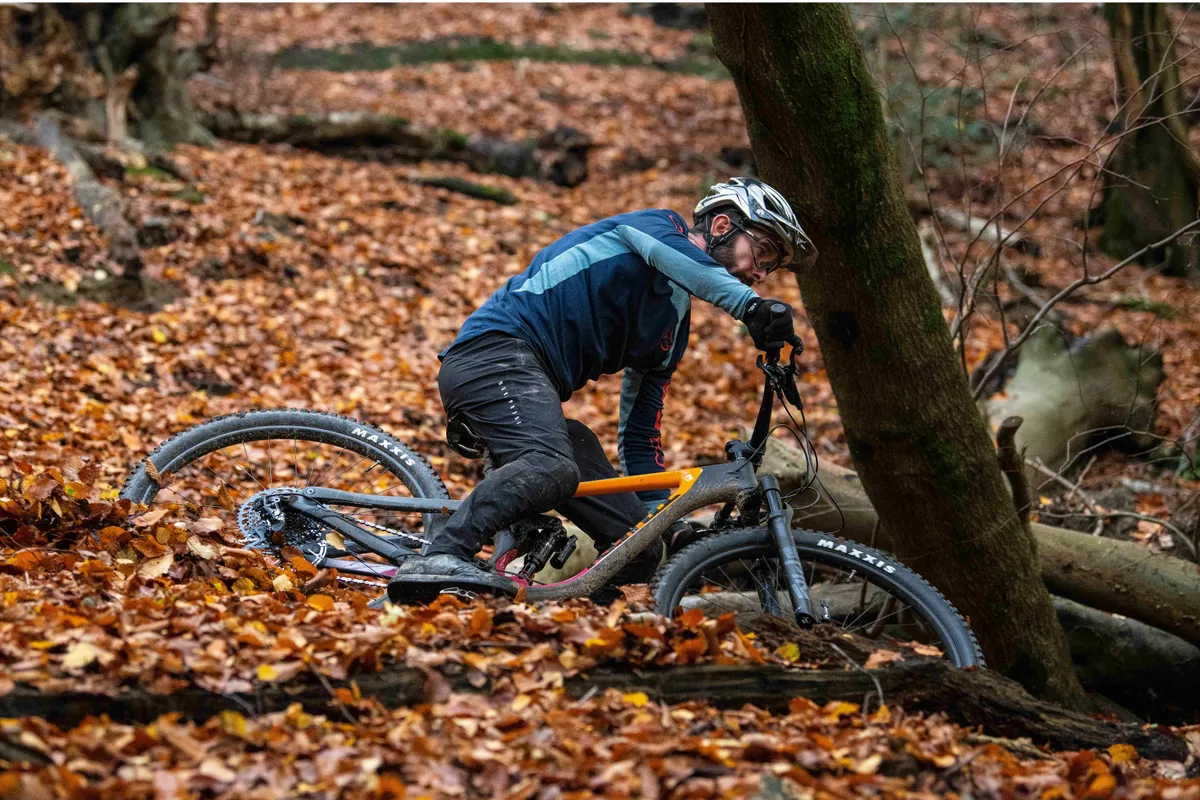
Wide mountain bike handlebars are becoming the norm, and provide extra stability, comfort and control.
Trail bikes follow this trend, many coming with a 760mm or 780mm bar, while some go up to 800mm. Just as smaller-sized trail bikes tend to have smaller 27.5in wheels, they also come with a narrower bar, going down 740mm, to help make the bike a better fit for smaller riders
Dropper posts
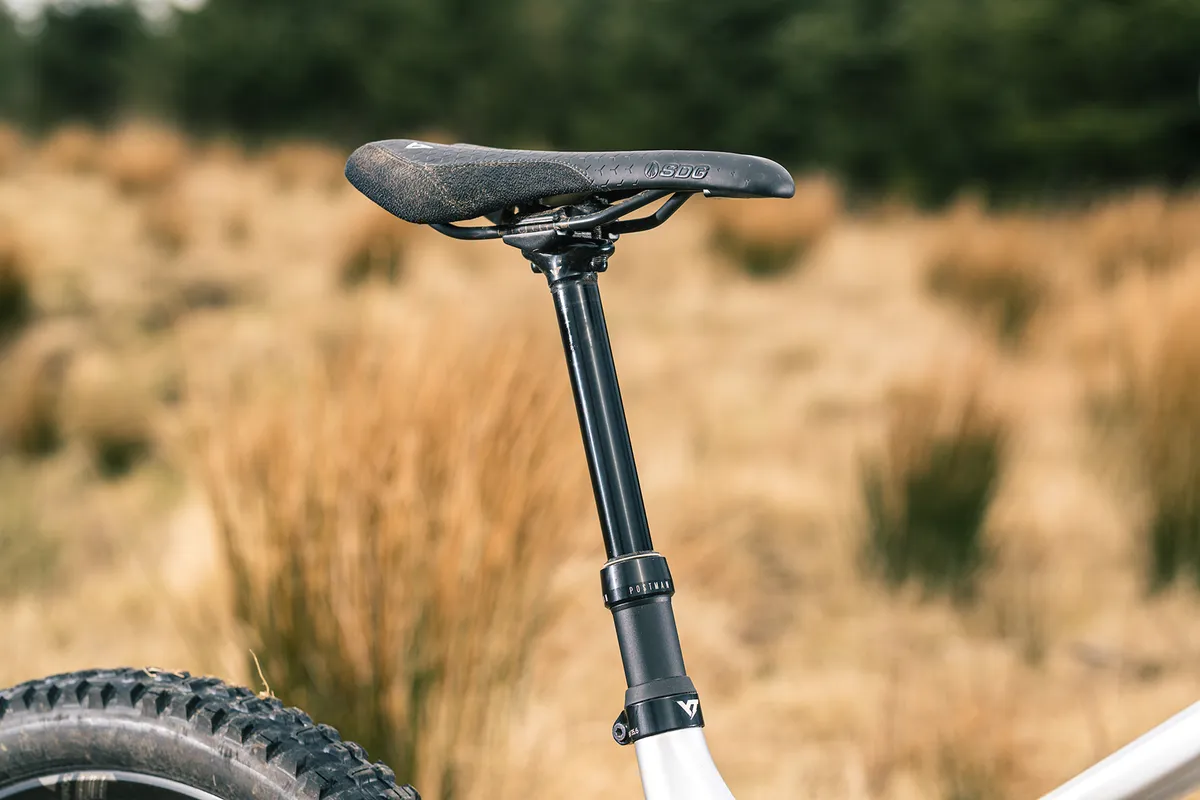
Dropper posts are almost standard on trail bikes.
They allow you to lower and raise your saddle with the flick of a handlebar-mounted button, giving you extra room to move your weight around on descents and the correct saddle height for efficient pedalling.
A dropper post is one of the first upgrades you should consider if your trail bike doesn't have one, because it will open the bike up to a wider range of riding.

